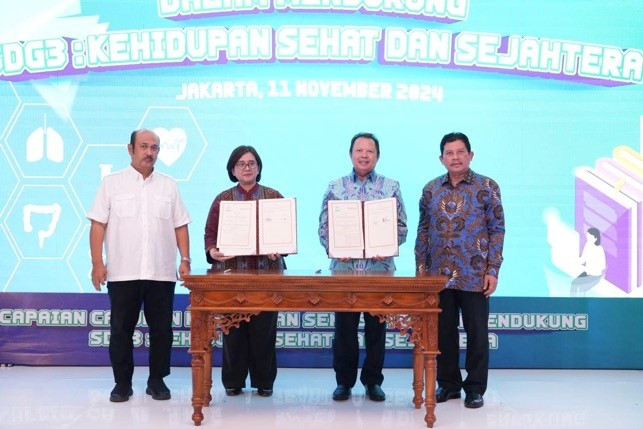Popular Reads
Top Results
Can't find what you're looking for?
View all search resultsPopular Reads
Top Results
Can't find what you're looking for?
View all search resultsBPJS Kesehatan and Bappenas sign MoU, launch ‘Morbidity Tables’ book to support SDGs
Change text size
Gift Premium Articles
to Anyone
I
n a bid to enhance collaboration in implementing the National Health Insurance (JKN) program and advance the Sustainable Development Goals (SDGs), the Ministry of National Development Planning/National Development Planning Agency (Bappenas) and the Healthcare and Social Security Agency (BPJS Kesehatan) signed a memorandum of understanding (MoU) on Nov. 11 in Jakarta.
The signing was witnessed by Minister of National Development Planning/Head of Bappenas Rachmat Pambudy and BPJS Kesehatan President Director Ali Ghufron Mukti.
“BPJS Kesehatan, as the administrator of the National Health Insurance program, holds a strategic role in transforming national health services. JKN is a pivotal policy in meeting basic health service needs within the scope of social transformation. It also contributes positively to economic growth, poverty reduction and quality human resource development, as shown by studies conducted by LPEM FEB UI and BPJS Kesehatan,” said Rachmat, referring to the Institute for Economic and Social Research at the University of Indonesia Economics and Business School.
The cooperation covers areas such as data and information exchange as well as studies on the JKN program to formulate national development and SDG policy recommendations. These encompass capacity building and improvements for human resource competencies in development planning, as well as data analysis and monitoring for the JKN program and evaluating achievements in national development and the SDGs.
“Through this collaboration, we hope BPJS Kesehatan will play an integral role in improving inclusive and equitable public health in Indonesia in alignment with SDG Goal 3: Good Health and Well-being,” said Ghufron.
“Indonesia has now achieved universal health coverage (UHC), with over 98 percent of the population enrolled,” he added, highlighting that achieving this milestone meant that the majority of Indonesians were protected from financial risks and had guaranteed access to essential health care, medicines and safe, effective vaccines.
The same event also saw the launch of Morbidity Tables for Indonesia Volume 1, the third title in the Mortality and Morbidity Tables for Indonesia series following the introductory volume and the second title, Mortality Tables for Indonesia. Together, the series provides comprehensive insights into mortality and morbidity rates across Indonesia.
Currently, Indonesia lacks a morbidity table with population-wide data. The World Health Organization (WHO) encourages each country to maintain comprehensive health data, including mortality and morbidity rates, to improve health systems and reach UHC, as stipulated in SDG Goal 3.8.
It is hoped that Morbidity Tables for Indonesia Volume 1 and other titles in the series will serve as a valuable reference in Indonesia and internationally.
Morbidity Tables was developed in collaboration with various stakeholders, including academics, health professionals, medical organizations and government agencies. Through extensive discussions and studies, mountains of data were analyzed and compiled into detailed tables that provide insight into the disease burden in Indonesia.
The book also includes comparisons from sources such as the Institute for Health Metrics and Evaluation (IHME), the Life Insurance Association of Indonesia (AAJI) and the 2023 Indonesian Health Survey (SKI), conducted by the Ministry of Health.
“The morbidity data in this book serves not only as a statistical reference, but also as a critical tool for health service planning and financial projections for the JKN program over the medium and long term,” said Mahlil Ruby, Director of Planning and Development at BPJS Kesehatan.
A seminar and dissemination event themed “The National Health Insurance Program's Contribution to Supporting SDG Goal 3: Good Health and Well-being” was also held. Featuring speakers from related sectors, including academia, Bappenas and the Ministry of Health, the seminar discussed the crucial role of the JKN in achieving UHC as well as the program’s contribution to this SDG Goal.
In closing, Rachmat expressed his hope that the Bappenas-BPJS Kesehatan collaboration would contribute significantly by monitoring the nation’s progress in implementing UHC toward meeting the 2030 SDG agenda, as well as support policy planning for the 2025-2029 National Medium-Term Development Plan (RPJMN) through further optimization of the JKN program.










